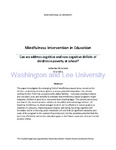Mindfulness Intervention in Education: Can We Address Cognitive and Non-Cognitive Deficits of Children in Poverty at School?

View/
Author
McColloch, Catherine
Subject
Washington and Lee University, Shepherd Poverty Program
Stress in children
Child psychology
Poverty
Social skills in children
Early childhood education
Child mental health
Child development
Mindfulness-based cognitive therapy
Metadata
Show full item recordDescription
Capstone; [FULL-TEXT FREELY AVAILABLE ONLINE] Cahterine McColloch is a member of the Class of 2012 of Washington and Lee University. This paper investigates the emerging field of mindfulness-based stress reduction for children, examining current programs to assess potential integration into schools serving children from low socioeconomic status families. It explores existing evidence and considers costs and benefits to evaluate how mindfulness-based programs might empower children in poverty to overcome their disadvantages. The central conclusions are that (1) the current practice exhibits its feasibility with school-age children, (2) teaching mindfulness to disadvantaged children can be effective in reducing adverse reactions to stressors, improving psychological well-being, fostering cognitive skill formation and in enhancing socio-emotional skill and that (3) significant obstacles and costs of the program in the context of poverty exist, but the probable potential that this tool may effectively narrow the education gaps render future expansion of experimental practice critical. Catherine McColloch